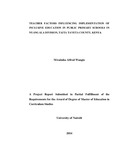| dc.description.abstract | Inclusive education promotes education of all learners in mainstream schools including those with special needs. Teachers play a critical role towards realization of this process. The purpose of this study was to investigate teacher factors influencing implementation of inclusive education in public primary schools in Nyangala Division Taita Taveta County, Kenya. The objectives of the study were to: establish the extent to which teachers‟ age and gender; teachers‟ academic and professional qualifications; teachers‟ teaching experience; teachers‟ teaching styles and perceptions influence implementation of inclusive education in public primary schools. The study used descriptive survey design. The target was 8 head teachers, 82 teachers and 352 pupils. The researcher purposively sampled 8 head teachers, randomly selected 64 teachers and used both purposive and simple random sampling techniques to select 196 pupils. Teachers completed questionnaires while pupils participated in focus group discussions. Data were analyzed using descriptive statistics and content analysis. The researcher established that both age and gender of the teachers influenced implementation of inclusive education. It was also found that teachers‟ academic and professional qualification influenced implementation of inclusive education in public primary schools. Teachers‟ experience positively influenced implementation of inclusive education in public primary schools. Teaching styles negatively influenced implementation of inclusive education in public primary schools thus contributing to learners‟ dropout. Finally, the researcher found that perception of teachers towards inclusive education was negative and thus an impediment towards implementation of inclusive education. In view of these findings, the researcher concluded that teacher factors such as age and gender, academic and professional qualifications, teaching experience, teaching styles and their perceptions towards inclusion needs to be enhanced through training for effective implementation of inclusive education in public primary schools. Based on these findings the researcher recommended that; head teachers ought to assign older teachers inclusive classes for effective implementation of inclusive education, the government through Ministry of Education boost up training of teachers on how to handle pupils with special needs through in-service trainings. The government through Teachers Service Commission to recruit trained teachers, the head teachers of primary schools need to ensure that more experienced teachers who have undergone special education training are allocated inclusive classes for effective implementation of inclusive education, the head teachers should use subject panel meetings to encourage teachers to use teaching styles such as peer tutoring which will suit the needs of learners with learning disabilities. Finally, the government using the Quality Assurance and Standards Officers should sensitize teachers on the rationale for inclusive education through workshops and seminars. The researcher suggests that a similar study should be replicated in the entire County to establish teacher factors influencing implementation of inclusive education. | en_US |

